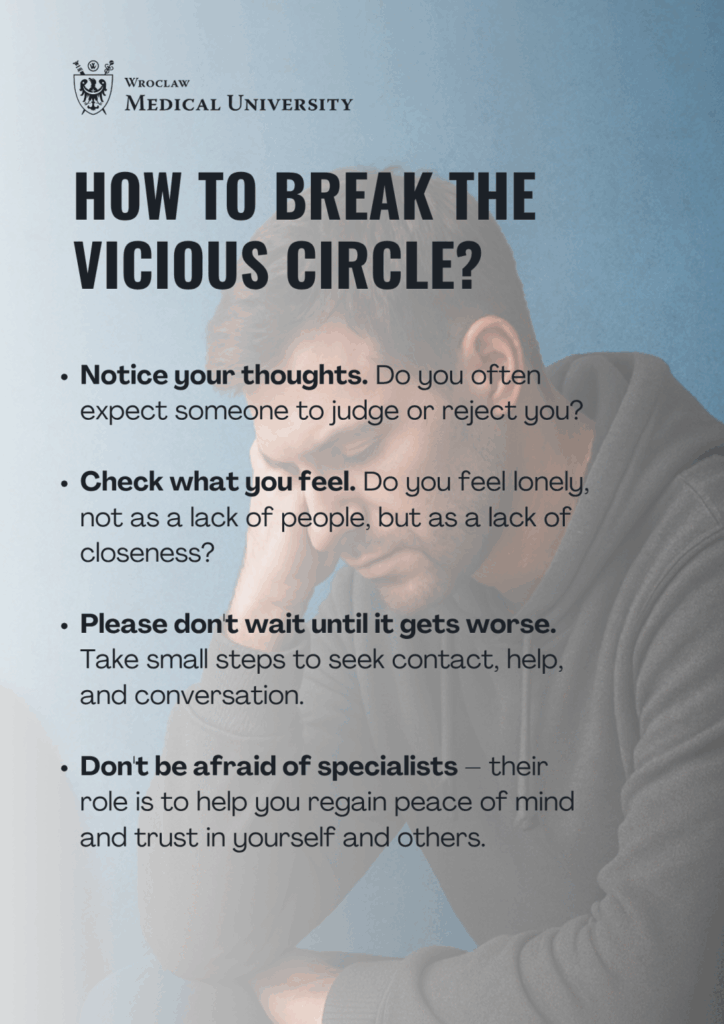Have you ever felt that others were talking about you? That someone had bad intentions towards you, even though you had no proof? And at the same time, feel increasingly lonely, withdrawn, and deprived of support? Although it may not seem obvious, loneliness and suspicion of others often go hand in hand. They can also feed off each other.
This phenomenon was studied by a team of scientists from Wroclaw Medical University under the supervision of Prof. Błażej Misiak from the Clinical Department of Psychiatry. They analyzed data from over three thousand adults from all over Poland. The results clearly show that it is not social isolation itself, but the subjective feeling of loneliness that is most closely related to the development of paranoid thoughts.
What is paranoid thinking?
The study focused on two types of thoughts:
- Ideas of reference – the belief that we are the object of observation or comments by others (“they are talking about me,” “they are laughing at me”).
- Persecutory ideas – the belief that someone is acting against us (“someone wants to hurt me,” “they are watching me”).
It turned out that loneliness was strongly associated with the first type, the feeling that others are looking at us, judging us, commenting on us. These are subtle but often very burdensome thoughts that can significantly impair our quality of life.
Thoughts begin in the mind
The study showed that the most important mediator between loneliness and suspicion is our thinking patterns, i.e., how we interpret the behavior of others.
Lonely people are more likely to expect rejection, attribute hostile intentions to others, and be more vigilant in looking for social threats. Even if there are none, these mechanisms can cause us to avoid interactions that were once natural to us, and the world begins to seem increasingly hostile.
Loneliness and isolation
Do you feel lonely even though you have friends? Or, on the contrary, do you have no one to go out with in the evening, but you don’t feel bad about it? It’s possible.
“Loneliness, unlike social isolation, is a subjective experience defined as a perceived lack of satisfaction with the number or quality of social interactions. In an evolutionary context, it is recognized as an alarm signal aimed at rebuilding our social bonds. Therefore, it can be beneficial to us, especially when it is a temporary phenomenon that motivates us to interact with other people”, points out Prof. Misiak.
The problem begins when, instead of motivating us, loneliness begins to paralyze us. It then leads to withdrawal, isolation, and growing distrust.
Analyses also show that in people who experience severe psychotic-like symptoms, loneliness is not only stronger but also more stable over time – it does not change from day to day but remains at a high level. Importantly, the key mechanism that links loneliness to a sense of threat is the so-called anticipation of danger – a difficult-to-grasp feeling that “something bad is about to happen.” This type of state can reinforce suspicion, anxiety, and withdrawal. Interestingly, similar relationships were not observed in the case of social isolation alone – it was not the number of contacts, but how relationships were experienced that proved decisive. This further confirms how important it is to notice and understand one’s own emotions before loneliness turns into a permanent sense of threat.
When is it worth seeking help?
Not all suspicion is a problem. But some situations should concern us.
“If such thoughts are persistent, recur in many situations, and affect social interactions or daily functioning, they may indicate heightened paranoid tendencies,” explains Prof. Misiak. “Particular attention should be paid when there is no objective evidence for these assessments or when it is difficult to challenge them rationally. In such a situation, it is worth consulting a psychologist or psychiatrist,” he adds.
It is then worth giving yours
elf the chance to seek professional support. This is not a sign of weakness, but a step towards greater security. However, there is no single simple solution. But there are ways that, although they take time, really work.
“A “small steps” approach can help, i.e., gradually engaging in small social interactions and consciously questioning negative thoughts. It is also beneficial to discuss your feelings with a trusted person or consult a specialist who, through psychoeducation and training in cognitive-behavioral techniques, can help you rebuild social bonds”, explains the Wrocław psychiatrist.
It is the combination of changing the way you think and learning social skills that gives the best results.
– “Approaches that combine elements of cognitive-behavioral therapy and social skills training have proven to be effective. Interventions focused on improving so-called social processing – that is, the way we interpret the intentions and emotions of others – are also increasingly being used. It is essential to strengthen the sense of agency and build positive relationships in a safe environment”, says Prof. Misiak.

This material is based on an article:
Cognitive processes and pathways between social isolation, loneliness, and paranoia: findings from a cross-lagged network analysis of population-based data
Author: Błażej Misiak